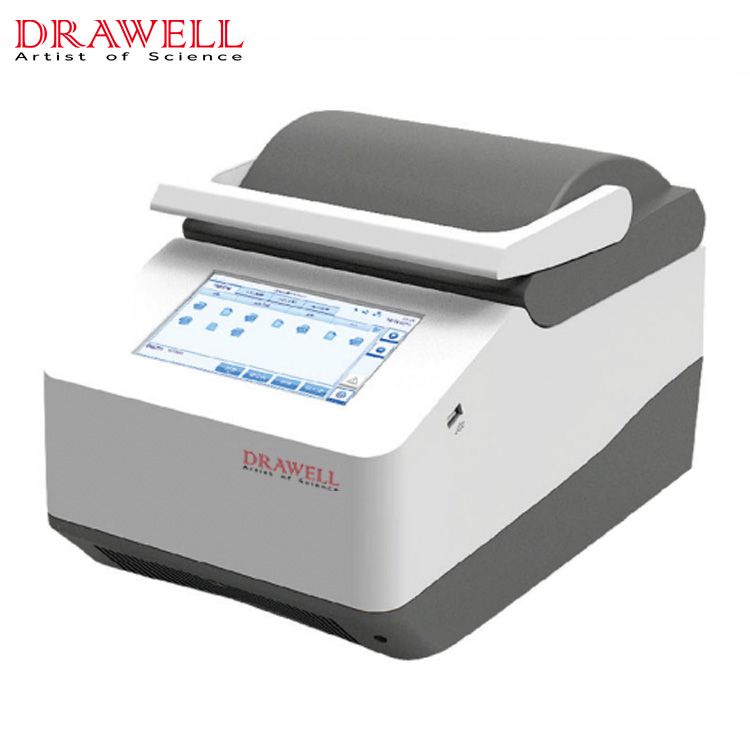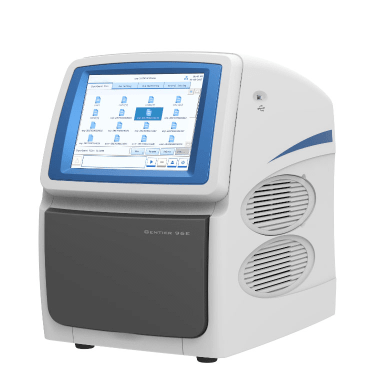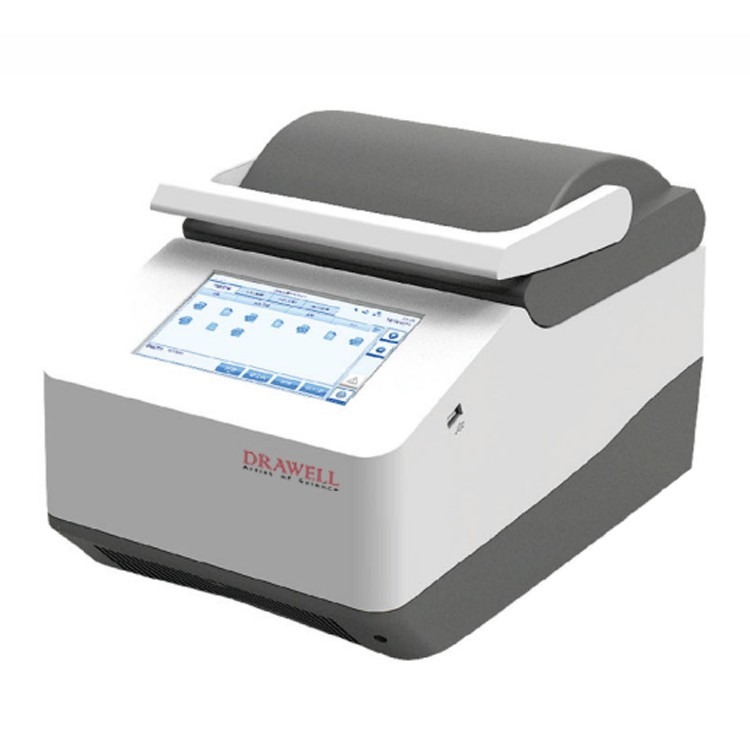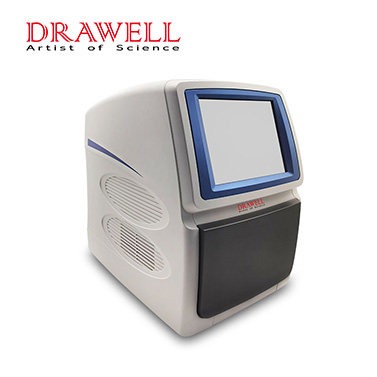Polymerase Chain Reaction (PCR) is a technical method that has revolutionised molecular biology by allowing scientists to amplify particular portions of DNA with unparalleled precision and efficiency. Taq polymerase, an enzyme produced from the extremophile bacterium Thermus aquaticus, is at the heart of this ground-breaking approach. Because of its particular features that make it an ideal choice for PCR, Taq polymerase has become a fundamental tool in molecular biology. In this article, we will focus on the reasons why is taq polymerase used in PCR and its important role in the amplification of DNA.

Heat Stability of Taq Polymerase Used in PCR
Taq polymerase’s heat stability is one of its important characteristics that makes it appropriate for use in PCR (Polymerase Chain Reaction).
At temperatures above 60-70°C (140-158°F), traditional DNA polymerases, such as those found in human cells, denature. Taq polymerase, on the other hand, is derived from T. aquaticus, which flourishes in hot springs where temperatures can reach 70°C. This bacterium has developed to thrive in such harsh circumstances, and Taq polymerase, its polymerase enzyme, has inherited this heat-resistant characteristic.
The reaction goes through a series of temperature cycles during PCR, including denaturation, annealing, and extension. The DNA strands must be heated to roughly 94-98°C (201-208°F) during the denaturation step to divide the double-stranded DNA template into two single strands. Many enzymes would denature and lose catalytic activity at this temperature, leaving them inefficient for DNA amplification. However, Taq polymerase remains stable and active even at these high temperatures.
Taq polymerase’s capacity to withstand denaturation allows it to play an important role during the PCR extension stage. The temperature is normally reduced to 72°C (162°F) in this stage, and Taq polymerase uses the single-stranded DNA template as a template to manufacture a complementary DNA strand. The enzyme extends the developing DNA chain by adding nucleotides, resulting in a new copy of the target DNA sequence. In each PCR cycle, this procedure is repeated, resulting in exponential amplification of the desired DNA fragment.
The heat stability of Taq polymerase is critical for the success of PCR because it guarantees the enzyme remains active throughout the thermal cycling process. Without this property, the enzyme would denature and lose its ability to synthesize DNA at the elevated temperatures necessary for denaturation and extension.

DNA Synthesis of Taq Polymerase Used in PCR
Taq polymerase is essential in the extension phase of PCR. The temperature is reduced once the DNA template has been denatured and the primers have annealed to their respective target areas to allow Taq polymerase to begin DNA synthesis. The enzyme takes advantage of the single-stranded DNA template to create a complementary DNA strand by adding nucleotides.
At the annealing temperature, Taq polymerase binds to the primer-template complex and positions itself at the 3′ end of the primer. It starts DNA synthesis by catalyzing the addition of deoxyribonucleotide triphosphates (dNTPs), one nucleotide at a time. Following the base-pairing guidelines (A-T and G-C), the nucleotides are chosen based on their complementarity to the template DNA strand.
The DNA synthesis process carried out by Taq polymerase involves the following steps:
- Binding and positioning: Taq polymerase binds to the primer-template complex and positions itself at the 3′ end of the primer.
- Nucleotide addition: Taq polymerase catalyzes the addition of the necessary dNTPs to the developing DNA chain based on the template sequence. The enzyme identifies the exposed DNA bases on the template strand and integrates complementary nucleotides preferentially.
- Phosphodiester bond formation: Taq polymerase forms a phosphodiester bond to connect the incoming nucleotide to the existing DNA chain. This procedure adds one nucleotide to the DNA strand.
- Processivity: Taq polymerase has a high processivity, which means it can continue progressively adding nucleotides to the expanding DNA chain without easily dissociating from the DNA template.
Taq polymerase creates a complementary DNA strand by repeating this cycle of nucleotide addition, duplicating the target area of the DNA template. In PCR, this process is repeated numerous times through denaturation, annealing, and extension cycles, resulting in exponential amplification of the desired DNA fragment.

Exonuclease Activity of Taq Polymerase Used in PCR
Taq polymerase’s exonuclease activity contributes to DNA replication fidelity by proofreading and eliminating misincorporated nucleotides.
Taq polymerase’s exonuclease activity works in the following way:
Recognition of misincorporated nucleotide: When Taq polymerase inserts an erroneous nucleotide to the developing DNA chain, the enzyme detects the error due to a mismatch between the template strand and the incorporated nucleotide.
Exonucleolytic removal: Taq polymerase cleaves the phosphodiester bond between the incorrect nucleotide and the growing DNA chain using its 5’→3′ exonuclease activity. This removal occurs in a stepwise manner, removing one nucleotide at a time from the 5′ end of the growing DNA chain.
Resumption of DNA synthesis: Taq polymerase can continue DNA synthesis after the misincorporated nucleotide has been removed by adding the proper nucleotide to the developing DNA chain, guided by the template sequence.

Compatibility of Taq Polymerase with PCR Components
Taq polymerase’s compatibility with PCR components simplifies the experimental workflow, improves reproducibility, and allows for consistent results across laboratories and investigations.
Here are some of the most important elements of Taq polymerase’s compatibility with PCR components:
Primer binding: During the annealing step of PCR, Taq polymerase efficiently binds to the primers. Primers are designed to flank the target DNA region and serve as the beginning point for DNA synthesis. The capacity of Taq polymerase to bind to primers provides accurate targeting and amplification of the desired DNA segment.
Nucleotide incorporation: During the extension phase of PCR, Taq polymerase successfully integrates nucleotides. It synthesizes the complementary DNA strand using the available deoxyribonucleotide triphosphates (dNTPs) in the reaction mixture. The enzyme’s capacity to precisely and effectively integrate nucleotides leads to the amplification of the target DNA fragment.
Buffer compatibility: Taq polymerase is compatible with the majority of PCR buffers used in PCR procedures. These buffers supply the required ionic strength, pH, and co-factors for optimal enzyme action. Taq polymerase remains active and stable in a variety of buffer conditions, ensuring consistent performance across a wide range of experimental setups.
Thermal cycling: The heat stability of Taq polymerase permits it to resist the thermal cycling process of PCR. The enzyme can withstand multiple denaturation, annealing, and extension cycles that involve rapid temperature fluctuations. Taq polymerase stays active and capable of DNA synthesis throughout the PCR process, ensuring consistent amplification of the target DNA region.
Reaction components: Taq polymerase is compatible with a wide range of PCR reaction components. Mg2+ ions, for example, are required for enzyme activity for improving PCR conditions. Taq polymerase performs best when the optimum concentration of Mg2+ is present in the reaction mixture. Taq polymerase is also compatible with PCR additives like bovine serum albumin (BSA) or dimethyl sulfoxide (DMSO), which can be employed to improve amplification in difficult DNA templates or complex reaction conditions.

Commercial Availability of Taq Polymerase Used in PCR
Here are some key aspects of the commercial availability of Taq polymerase:
Biotechnology companies: Taq polymerase is produced and distributed by a number of biotechnology companies that specialize in the development and distribution of molecular biology products. To meet the different demands of researchers and laboratories worldwide, these businesses offer a wide selection of DNA polymerases, including Taq polymerase.
Product formats: Taq polymerase is commercially available in a variety of formats to meet a variety of experimental needs. Taq polymerase enzymes, master mixes, and full PCR kits are the most frequent formats. Taq polymerase enzymes that are stand-alone deliver only the enzyme and require the inclusion of other PCR components. Taq polymerase, dNTPs, reaction buffers, and other essential components are typically included in master mixes, making it easier to set up PCR operations. Complete PCR kits typically include all of the necessary PCR components, such as primers, nucleotides, buffers, and Taq polymerase, providing a handy all-in-one solution.
Specialized formulations: Taq polymerase customized formulations are frequently offered by biotechnology companies to meet specific PCR applications. Companies, for example, may offer high-fidelity versions of Taq polymerase with proofreading capabilities to reduce errors during DNA replication. Other formulations may be optimized for specific PCR conditions, such as those required for challenging templates or amplification of long DNA fragments.
Quality control and standardization: To maintain the consistency and efficacy of their Taq polymerase products, reputable biotechnology businesses employ stringent quality control techniques. These measures include stringent testing for enzyme activity, the absence of impurities, and the stability of the product under defined storage settings. The implementation of quality control techniques assures that researchers can rely on Taq polymerase’s functionality to produce consistent and reproducible PCR results.
Research and diagnostic applications: Taq polymerase, which is commercially available, is used in a variety of disciplines, including research laboratories, academic institutions, pharmaceutical businesses, clinical diagnostics, and forensic investigation. Its availability has democratized PCR technology, allowing researchers all across the world to perform genetic studies, develop novel diagnostic tests, and increase scientific understanding in a variety of industries.
Summary
Taq polymerase has transformed molecular biology by providing scientists with a powerful and efficient tool for DNA amplification. Because of its exceptional thermal stability, DNA synthesis capabilities, proofreading activity, compatibility with PCR components, and commercial availability, it has become the PCR enzyme of choice.



